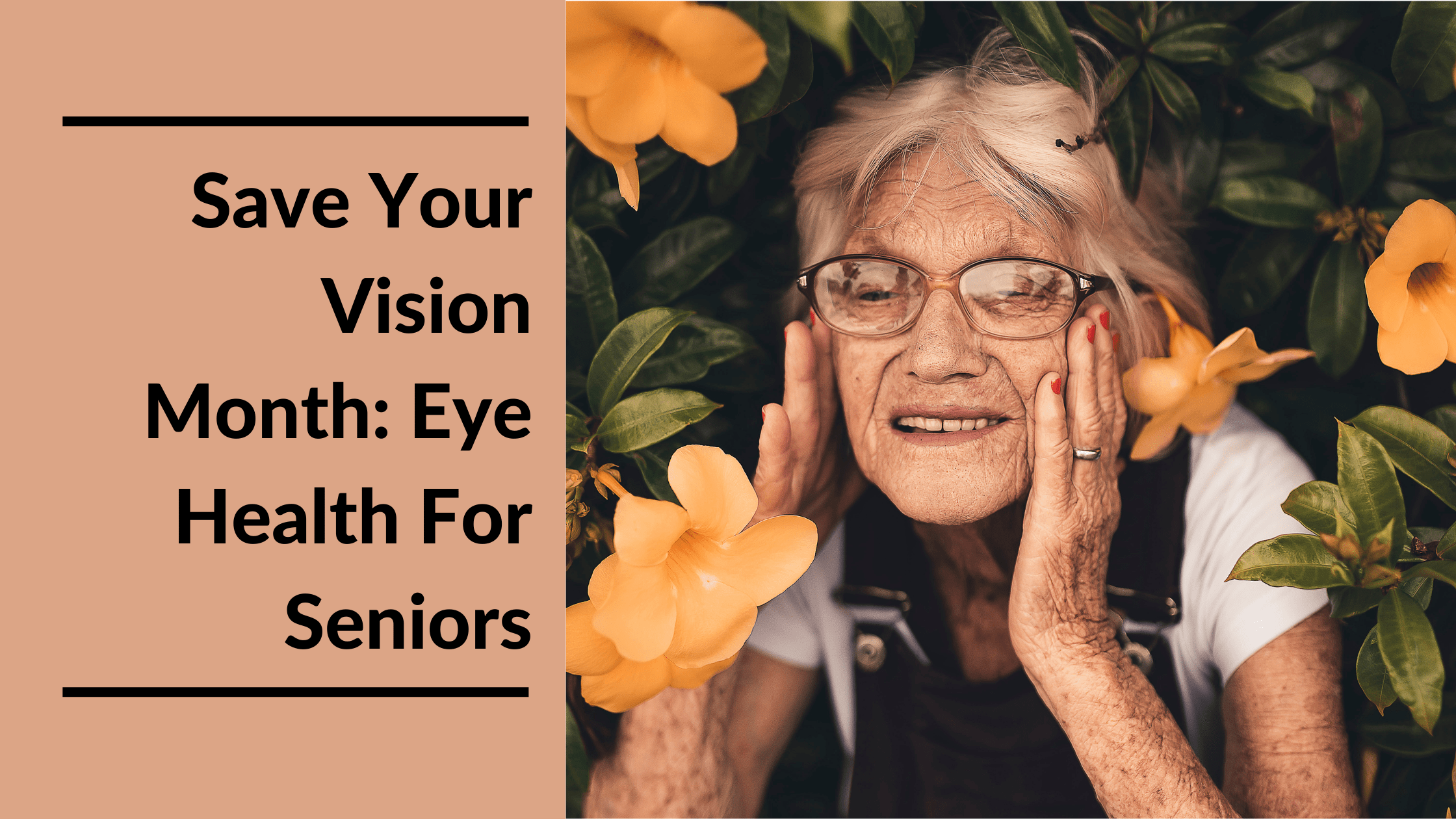
March is Save Your Vision Month, so it’s a great time to learn about common eye problems in seniors and ways older adults can protect their vision.
Updated August 19, 2022
What Is Save Your Vision Month?
Although everyone values the health of their eyes and takes steps to protect their vision, older adults must be extra diligent. Since March is Save Your Vision Month, now is a great time to learn about how you can protect your eye health. Established by the American Optometric Association (AOA), Save Your Vision Month aims to raise awareness about the importance of eye health and healthy habits to follow all year round.
It’s no secret that our eye health diminishes over time, which is why many older adults have problems with age-related macular degeneration or cataracts. These concerns can worsen and cause reduced eyesight or blindness if left untreated. But, these types of health concerns are easily preventable with the right nutrition and routine eye exams.
See how seniors can protect their vision and ensure the health of their eyes for years to come.
Common Eye Problems For Older Adults
Unfortunately, vision changes are an expected part of aging. In addition, many problems have no warning signs, so regular checkups are crucial.
Cataracts
Cataracts are the most common age-related issue affecting the eyes. An estimated 50% of Americans develop them by 80. Symptoms of cataracts include:
- Cloudy, blurry, or dim eyesight
- Seeing double or see halos of light
- Struggle to see in low light
- Light sensitivity
Sometimes, surgery may be necessary for advanced cataracts. But changing your eyeglass prescription might be enough if you catch it early.
Age-Related Macular Degeneration (AMD)

The macula sits in the middle of the retina toward the rear of the eye and helps us see fine details and colors. If you struggle to watch TV or read because of poor central vision but don’t experience changes in your peripherals, schedule an eye exam immediately. Early detection is crucial to prevent AMD from obstructing your vision and life.
Retinal Detachment
Retinal detachment is usually the result of the vitreous fluid in the back of the eye changing. When this occurs, the retina separates from the underlying tissue. If left untreated, retinal detachment can lead to lasting vision loss.
Presbyopia
Presbyopia causes the eye lens to harden and prevents the lens from properly working. This condition causes difficulty focusing on close-up things, such as fine print. Reading glasses can relieve this issue.
Dry Eye
Seniors without the right amount of “good quality” tears to moisten their eyes often experience this condition. Dry eye symptoms include:
- Blurred vision
- Burning sensations
- Gritty, watery, irritated eyes
If the symptoms worsen, it can lead to cornea damage.
Glaucoma
In the U.S., glaucoma accounts for 10% of blindness cases. This condition is an assortment of eye diseases that damage the optic nerve and lead to vision loss. Various factors put seniors at a higher risk for this problem. Still, it’s difficult to identify why older adults are more likely to develop glaucoma.
Save Your Vision Month Eye Health Tips
Even if you had 20/20 vision when you were younger, your eyesight might change the older you get. However, it’s not too late to protect your eyes by adopting healthy habits and lifestyle changes.
You don’t have to be an older adult to be proactive about your eyesight! In addition to the tips above, learn more about your family’s medical history to see if you’re at a higher risk for age-related eye problems. So if you have a family history of diabetes or high blood pressure, consider yearly physical exams to assess your blood pressure and glucose levels.
Diet And Nutrition

Eating right and maintaining a balanced diet benefits all body functions, including your eyesight. Here are some of the best foods to eat for eye health:
- Broccoli, kale, cooked spinach, oranges, and tangerines: Colorful produce like these contain lutein and zeaxanthin. These two crucial nutrients may lower the risk of macular degeneration and cataracts. Also, these nutrients are in spices like paprika and saffron.
- Fish, eggs, and whole grains: These foods contain essential fatty acids. These nutrients are vital to your retinas.
- Oranges, grapefruits, and papayas: Citrus fruits are rich in vitamin C, which may prevent cataracts and possibly slow macular degeneration when taken with other nutrients.
- Almonds, pecans, and sunflower seeds: Healthy nuts like these contain vitamin E and are beneficial for some parts of the eye. Vitamin E is also linked to lower risks of macular degeneration and cataracts in seniors.
- Lean red meat, beans, and whole grains: These foods are rich in zinc, an essential mineral for night vision, cataract prevention, and melanin production in the eyes.
Lifestyle
Getting into the habit of making lifestyle changes can be challenging. Still, it’s crucial if you want to have healthy eyes. Here are a few lifestyle changes you can make before, during, and after Save Your Vision Month:
- Wear sunglasses: When you are driving or outdoors, always make sure to wear sunglasses, so you protect your eyes from damage caused by UV rays.
- Take breaks when reading: Take a short break every half hour when you read, watch TV, or use your phone for an extended period. It will relieve eye strain as well as eye fatigue.
- Monitor your blood pressure: High blood pressure has many adverse effects on the body, including damaging the blood vessels in your eye.
- Exercise your eyes: It sounds silly, but eyes must work out, too! You can exercise your eyes by rolling them and moving them side to side.
- Schedule routine eye exams: Visiting your optometrist helps monitor your eye health and catch issues before they worsen. Besides that, it’s essential to check that your prescription is up-to-date so you don’t add additional stress to your eyes.
- Stop smoking: Among the many complications smoking causes, it damages the optic nerve and raises your susceptibility to cataracts.
MeetCaregivers Supports Save Your Vision Month
Any degree of vision loss is devastating and can lead to feelings of helplessness, loss of independence, depression, and more. Save Your Vision Month aims to overcome these challenges by raising awareness of eye health. But even with diminished eyesight, you can still maintain your well-being and quality of life with our help. Our qualified caregivers can help with transportation, dressing, cooking, and more.
Call us at 1 (888) 541-1136, or for general inquiries, message us at info@meetcaregivers.com.
Visit the Blog for resources and tips for happy, healthy senior living.
- Bemis, Elizabeth. “The Importance of Eye Health for Seniors.” UMH, 27 Mar. 2017, www.umh.org/assisted-independent-living-blog/bid/273436/the-importance-of-eye-health-for-seniors.
- Gougler, Matt. “Aging and Your Eyes.” ATRIO Health Plans, 7 Mar. 2018, www.atriohp.com/news-blog/2018/march/aging-and-your-eyes/.
“The Importance of Senior Eye Health: ASC Blog.” ASC, 8 Mar. 2016, www.asccare.com/save-your-vision-month/. - Watt, Tim. “Sight Loss Prevention Tips – Save Your Vision Month.” Sunrise Senior Living, 30 Mar. 2016, www.sunriseseniorliving.com/blog/march-2016/sight-loss-prevention-tips–save-your-vision-month.aspx.
